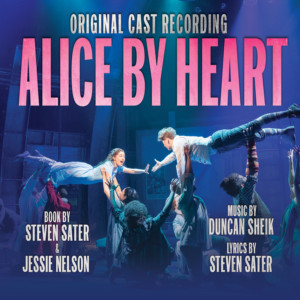BWW Album Review: ALICE BY HEART Is Almost a Wonder

Did we really need yet another take on Alice in Wonderland? The Lewis Carroll classic is one of those stories, like The Wizard of Oz, that's so rich and creatively tempting for writers to attempt their own takes on it. In the case of Alice by Heart, this year's off-Broadway musical that ties the famous story to the London Blitz during World War II. With a score by Duncan Sheik and Steven Sater, the cast recording is a little uneven in parts but still manages to hit the gut-punch of emotion when it counts.
Sheik and Sater are, of course, best known as the Tony-winning team behind Spring Awakening, and the similarities in style and lyrical content are evident here. From the album's lovely opening song, the evocative and slightly folky "West of Words," there are all the Sheik/Sater trademarks: a haunting chorus, poetic (if occasionally obtuse) lyrics, and image-heavy songs. In many ways, this approach feels like a good match for the Wonderland mythos, although it doesn't always match up quite right.
Leading the way are the wonderfully talented Molly Gordon, as the latest iteration of Alice (here an adolescent girl in a London bomb shelter), and Colton Ryan, as her ill best friend Alfred. Their early duet "Still" taps into one of the major through lines of the score and, indeed, of the Wonderland mythos as a whole: the timeless power of imagination and storytelling to fend off even the worst things, at least for a little while. Here, the theme of time - as in "I'm late!" - is reversed: the characters (Alfred in particular) are being pursued by time, not the other way around. It's a smart tweak, and one that produces some of the most emotionally effective musical moments.
Most of those moments, ultimately, belong to Gordon and Ryan. "Another Room in Your Head" is a bittersweet moment, both youthfully romantic and packed with regret as the duo wonder about the clock running out, quite literally, on their time together - and what happens next. "Afternoon," the penultimate track on the album, is possibly the most affecting: it's one of those goodbye songs that Sheik and Sater do so, heartbreakingly well. Every note is expressive, the instrumentals are beautiful, and Gordon and Ryan's vocals couldn't be better.
That second theme - grief - runs deeper than expected in the show, and it produces a handful of other very moving songs, most notably the ensemble number "Your Shell of Grief." In its gentle, rough-around-the-edges way, it muses on the paradox of being alone in grief and yet connected in that grief is one experience that we all share at some point. Sheik and Sater find poetry in opposite images again in the finale, "Winter Blooms," which swells up to a full-ensemble sound before ending on a simple, narrowed-down note.
Not all of the songs are quite so successful, however. In the quirkier, more up-tempo songs, Sheik and Sater can't quite seem to find the sweet spot of weirdness. Songs like "Do You Think We Think You're Alice" and the empowerment anthem "I've Shrunk Enough" make strange choices that are too weird to flow naturally and not weird enough to really push it all the way into uncanny bizarre-ness territory. This is no criticism of the talented cast: Wesley Taylor and Heath Saunders, in particular, bite into their wacky roles with glee, and Noah Galvin is clearly having a blast on "Manage Your Flamingo," the one beacon of weirdness that reads like a particularly daffy riff on Hamilton's King George III. Grace McLean steals the spotlight on her featured song, diva-ing it up on "Isn't It a Trial?" But the brilliance comes in fits and starts throughout the album, peppered in between yet another folksy chorus and more vague lyrics evoking images of the natural world.
In the end, that unevenness is what keeps Alice by Heart from being excellent, as opposed to simply decent. The score is at its best when it embraces the bittersweet intersection of youth and grief - something that Sheik and Sater explored (more effectively) in Spring Awakening as well. The end result is something that hits some emotional highs, but isn't quite yet a true wonder.
Add Your Comment
Videos
